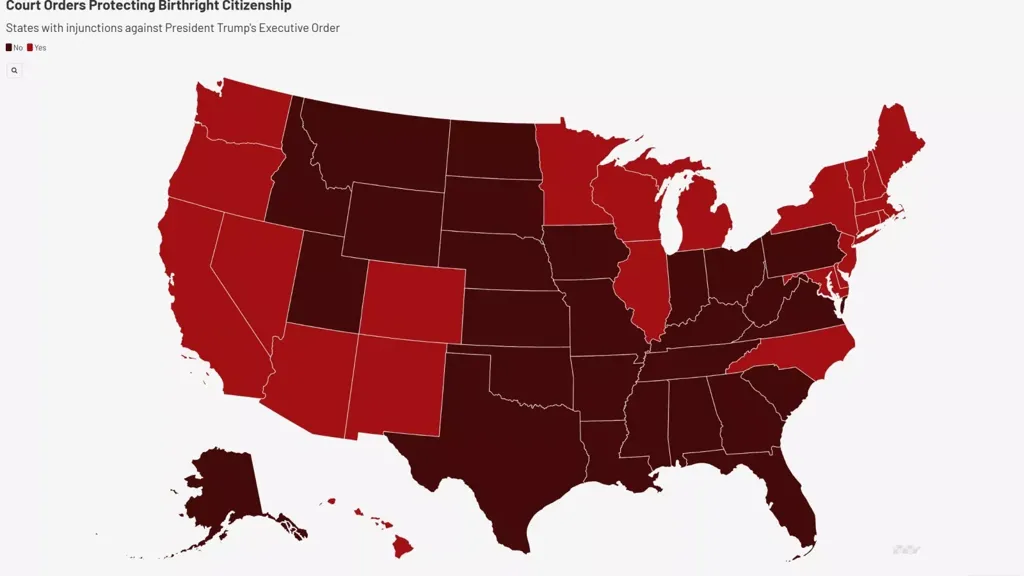Friday morning's 6-3 ruling on universal injunctions meant that the president's move to restrict automatic U.S. citizenship to babies born to American citizens and those with permanent legal status could go into effect. However, that will not be the case in every state.
"I'm delighted that the Supreme Court took an important step to reign in lawlessness in the lower courts, which have repeatedly issued 'universal' injunctions far beyond the parties to the case and hence beyond their legal, jurisdictional, and constitutional authority," John Eastman of the Claremont Institute which advocated for Trump's changes told Newsweek.
"But there remains room for the lawlessness in the lower courts to continue because the Court majority left open the possibility that the same results could be accomplished via nationwide class actions. The concurring justices warned against such games, but I doubt the lower courts will heed the warning."
While conservative justices made it clear they were not ruling on birthright citizenship itself, their move to clean up judicial powers potentially leads to a patchwork approach to how birthright citizenship will be applied in around a month when Trump's changes can take effect.
At the center of Friday's ruling were three lower court cases from Massachusetts, Maryland, and Washington, where judges had issued universal injunctions blocking a January executive order.
The Trump administration argued that local courts should not be able to block executive policies nationwide, a position with which the Supreme Court agreed. That now means those three rulings will be limited to those specific states, as well as to the states that joined the individual lawsuits.
Those three states were not the only ones to have seen judges issue injunctions on birthright citizenship restrictions; they were just the ones that lent their names to the cases that reached the Supreme Court.
In the remaining states, Trump's order can go into effect 30 days after Friday's ruling, pending any further legal action. That order limits birthright citizenship to those who are U.S. citizens or in the country with legal permanent residency, excluding those on visitor and temporary visas, as well as undocumented immigrants.
Professor Samuel Bray, a nationwide injunctions expert at Notre Dame Law School, told Newsweek that there would likely be litigation now on two fronts -- Firstly, the states that want broader injunctions against Trump's executive order, and secondly, a "surge of new class actions" against how the executive order will be enforced.
Professor Samuel Bray, in his statement sent to Newsweek: "Given that the birthright-citizenship executive order is unconstitutional, I expect courts will grant those preliminary injunctions, and they will be affirmed on appeal. I do not expect the President's executive order on birthright citizenship will ever go into effect. Today's decision is a vindication and reassertion of the proper role of the federal courts in our constitutional system."
John Eastman of the Claremont Institute told Newsweek: "I am troubled by the outright falsehoods in the dissenting opinions regarding the claim that Trump's EO is 'patently unconstitutional' and a violation of long-settled law. My brief in the case points out a number of those falsities. And I'm sure we'll have more opportunity to do so as the case now progresses on the merits."
President Donald Trump, on Truth Social: "GIANT WIN in the United States Supreme Court! Even the Birthright Citizenship Hoax has been, indirectly, hit hard. It had to do with the babies of slaves (same year!), not the SCAMMING of our Immigration process. Congratulations to Attorney General Pam Bondi, Solicitor General John Sauer, and the entire DOJ."
Cody Wofsy, deputy director of the ACLU Immigrants' Rights Project, in a press release: "The executive order is blatantly illegal and cruel. It should never be applied to anyone. The court's decision to potentially open the door to enforcement is disappointing, but we will do everything in our power to ensure no child is ever subjected to the executive order."
